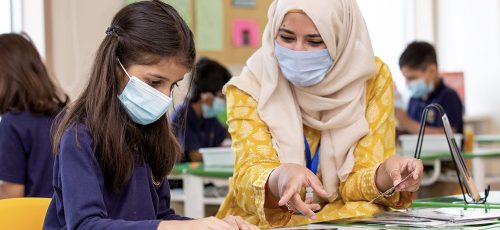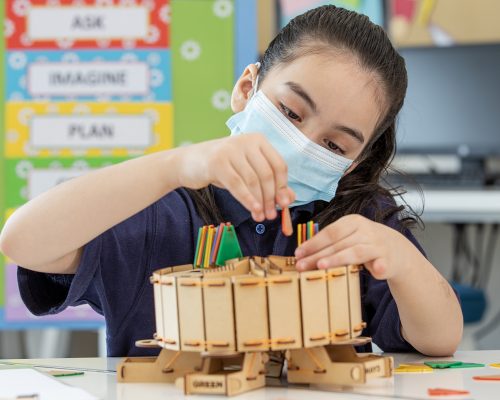Learn By Doing
The mission of L’école Mondiale is to provide the best possible education as also to mould strong religious and moral character of our younger generations. We aim to produce talented youngsters who would distinguish themselves by their knowledge, competence, religious, humanitarian and moral standards. The learners are groomed to approach all types of problems in a positive and constructive manner, to respond to the requirements of an ever-changing world, to show tolerance and respect to others and to serve their religion, society, country and humanity in the most befitting manner.
At L’école Mondiale, we know childhood is a treasured time. We believe it is our responsibility to provide environments and experiences that capture the joys of childhood, nurture each child’s individual growth and development, and pave the way for success in school and life.
We know how to make learning relevant at all levels.

Early Year School
Fostering Play-Based Programmes

Primary School
Making It Relevant – Helping Students Connect Their Studies to the World Today

HIFZ
A programme focused on memorising Quran word to word.

IGCSE
IGCSE is a curriculum developed by Cambridge for 14 to 16 year olds and is the international equivalent of the O Level.
Our unique learning environment
The foundations for a student’s entire learning journey are laid during the Pre and Primary years. This is a critical time when children learn to read, write and establish the basis of all future mathematical and scientific understanding.
L’école Mondiale’s programme draws together the best elements of international curricula, using inquiry as an integral part of students’ real-life learning. Inquiry is the vehicle for study that enables learners to ask questions, discover how to find answers and how to apply their skills and knowledge to the world around them.
EARLY YEARS PROGRAMME (EYP)
Fostering Play-Based Programmes
The first years of life lay the groundwork for a child’s future learning, behaviour and health. During these early years, children have a high potential for learning since they are innately curious and their brain is developing at a rapid rate. Foundations that are laid in a safe, secure, positive and nurturing environment enable a learner to thrive socially, emotionally and academically.
Initiating Learning through Constructive Participation and Purposeful Play
The Early School Programme at L’école Mondiale establishes the base for learning and understanding the message of the Quran and the building of children’s personalities around it. The programme is designed for active, hands-on participation of children aged between 3 and 5 years. It features constructive, purposeful play that promotes a motivation to learn, enhances perseverance, autonomy and positive social relationships. Play provides the framework for learning core content. As children explore, experiment and make discoveries, their knowledge grows. Mathematical concepts are investigated and an understanding of literacy is constructed. Inquiry processes contribute to insights into science and technology while play presents pathways to learn about social studies and the arts. An integral part of the ESP is the incorporation of sunnahs in daily life, the memorisation and recitation of selected sunnahs and masnoon duas, and the relevance of Islamic history, with particular focus on stories of prophets and their companions.
Strong connections between home and school enrich the young child’s early learning experiences. Families are encouraged to maintain regular communication with teachers to keep abreast of their child’s progress. Opportunities are provided throughout the year for parents to participate in class activities, parent-teacher conferences and information sessions.
PRIMARY YEARS PROGRAMME (PYP)
Making It Relevant – Helping Students Connect Their Studies to the World Today
Throughout the year, Primary students inquire into six globally significant issues. The inquiry process engages learners of all abilities in challenging and relevant activities that cross multiple subject areas. In this way, learners observe how things are interconnected, as in real life – rather than being fragmented into separate subjects. In addition to connecting disciplines, students learn to link their education to the reality of their world. The core skills of English, Urdu, Mathematics and Scientific discovery are carefully taught before being applied to real life contexts.
- Mathematics is taught in realistic contexts to help students make sense of the world around them.
- Science encourages curiosity and develops a sense of responsibility towards the natural, physical, material and technological worlds.
- Through Social Studies, students develop an understanding of their identity and their place in a rapidly changing world.
- Personal and Social Education (PSE) is integrated into all areas of the curriculum and it is the responsibility of every teacher in the school to ensure students develop positive attitudes, make healthy lifestyle choices and serve as respectful members of society.
- Akhlaq, adaab and ibadah are three virtues around which the whole of the tarbiyah plan revolves. In PSP students build upon the basics established during the ESP. Every person involved with L’école Mondiale contributes towards this tarbiyah through their actions and conduct. It is an ongoing and all-encompassing process that is not limited to Islamiyat or History lessons.
HIFZ PROGRAMME
The Messenger of Allah, peace be upon him said, “It will be said to the companion of the Qur’an: Recite and rise in status, recite as you used to recite in the world, for your status will be at the last verse that you recite.”
(At- Tirmidhi)
L’école Mondiale offers an opportunity to memorise the word of Allah along with tajweed rules and azkaar, under the guidance of experienced teachers in a quality environment. It’s a three-year program starting at the age of 9 years.
The hufaaz to be, not only memorise Quran during this period but are also given exposure to different disciplines, for example, English, Urdu, Mathematics, and Science along with 21st-century skills. All in all, L’école Mondiale brings to the hifz students a holistic experience combining both Quranic education with opportunities to excel in other academic subjects.
IGCSE
IGCSE is comprised of four years starting with Pre IGCSE to IGCSE3.
L’école Mondiale offers an informed curiosity and a lasting passion for learning in IGCSE with a strong impetus on developing a foundation in all key subject areas through a flexible, challenging, inspiring and international approach with Islamic values. It focuses on developing effective contributors, successful learners, responsible citizens, and confident individuals. Students gain the essential skills they need for success at college, university, and in their future careers. Careful attention is given to designing and implementing the curriculum by giving an environment that provides separate classrooms for boys and girls and a variety of co/extracurricular activities including sports, LMUN, language societies, and Robotics. All school staff supports the development of the Islamic values identified in the school’s mission.
IGCSE is comprised of four years starting with Pre IGCSE to IGCSE3. The academics are focused on the CAIE system and prepare students in the best possible way through detailed discussion processes and test sessions. Parents are involved in the student’s learning through regular coordination and sharing targets along with suggested strategies for the individual progress of students.
Breadth, balance, and coherence are built-in by design, aim to enrich personal and social outcomes as well as academic goals. The curriculum ensures that the learning does not begin or end in classrooms but permeates the school environment and broader community.
Language Arts
Math
Science
Sports
Why L’école Mondiale is different?
The school, building upon its history of 75 years in the education sector, aims to create a campus where learners will be crafted into intelligent inquirers, possessing a fervent desire to acquire knowledge and carrying strong moral and ethical values in line with the teachings of Islam.
School Fees
Inspired Teachers
Proven Approach to Education

Curriculum - Engaging Learning Experience
We Nurture Inquiring Minds – Our teaching methods stimulate independent thinkers.
The foundations for a student’s entire learning journey are laid during the Pre and Primary years. This is a critical time when children learn to read, write and establish the basis of all future mathematical and scientific understanding.
Languages
Promoting Global Citizenship and Harmony
English is the language of instruction in the school. Core subjects are taught in English, although all teachers are considered language teachers. The school takes a holistic approach to language which interweaves speaking, listening, reading and writing into all learning experiences. For example, grammar is taught in context, integrating it into students’ current work. Literature from around the world is used to support multiculturalism and global learning.
Authentic learning opportunities are provided to develop confidence and fluency in language in a safe and stimulating environment. As young students begin to learn English, they make mistakes. The efforts of the students are praised, and they are guided to recognise that making mistakes is an important part of the learning process.
Extra English support lessons are incorporated in the timetable for students who require additional practice and assistance.
The importance of Urdu as a mother tongue and national language is also recognised. A strong foundation in Urdu enables students to identify with their own culture and to communicate readily with family and community members. Research indicates that proficiency in a first language helps to provide the foundation for learning additional languages. Students are encouraged to use Urdu to help develop their English skills and to use Urdu for meaningful interactions while learning. This allows for the effective transfer of conceptual understanding from one language to another.
Younger students are exposed to stories, poems and texts written in Urdu while older students are expected to use reference materials from Urdu as well as English to assist their learning.
From Class 2 onwards, students are given an option to study either Arabic or French as a third language. Multilingualism is seen as a means for learners to develop their curiosity about the world and an understanding of other cultures. Ultimately this contributes to successful communication and promotes global citizenship and harmony.

